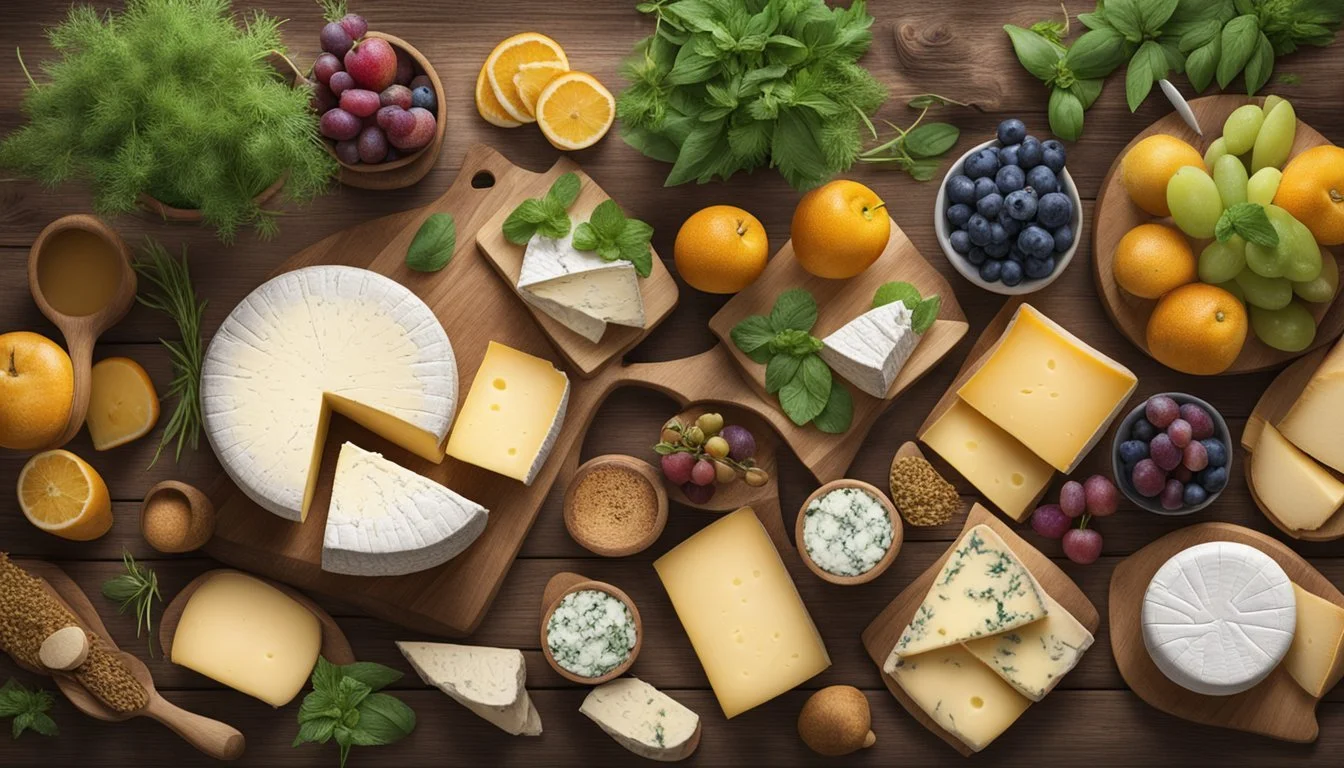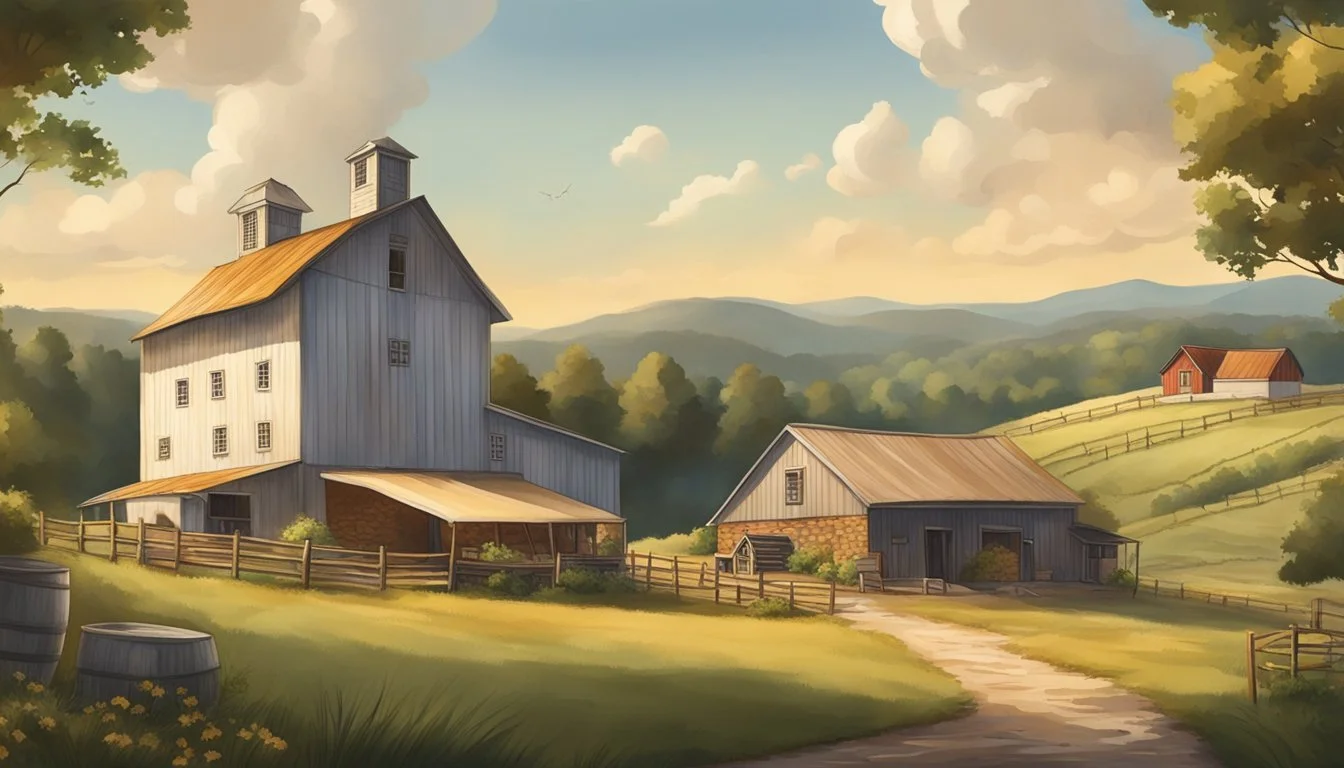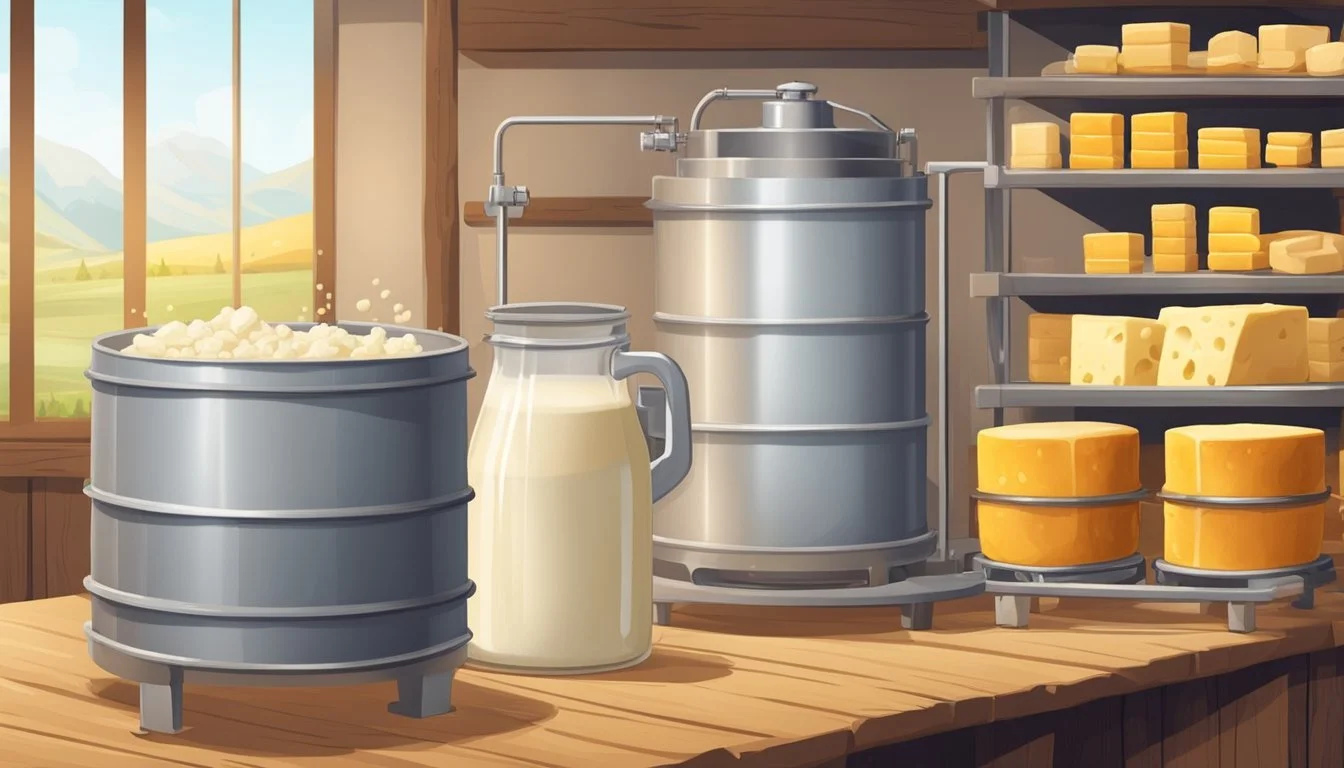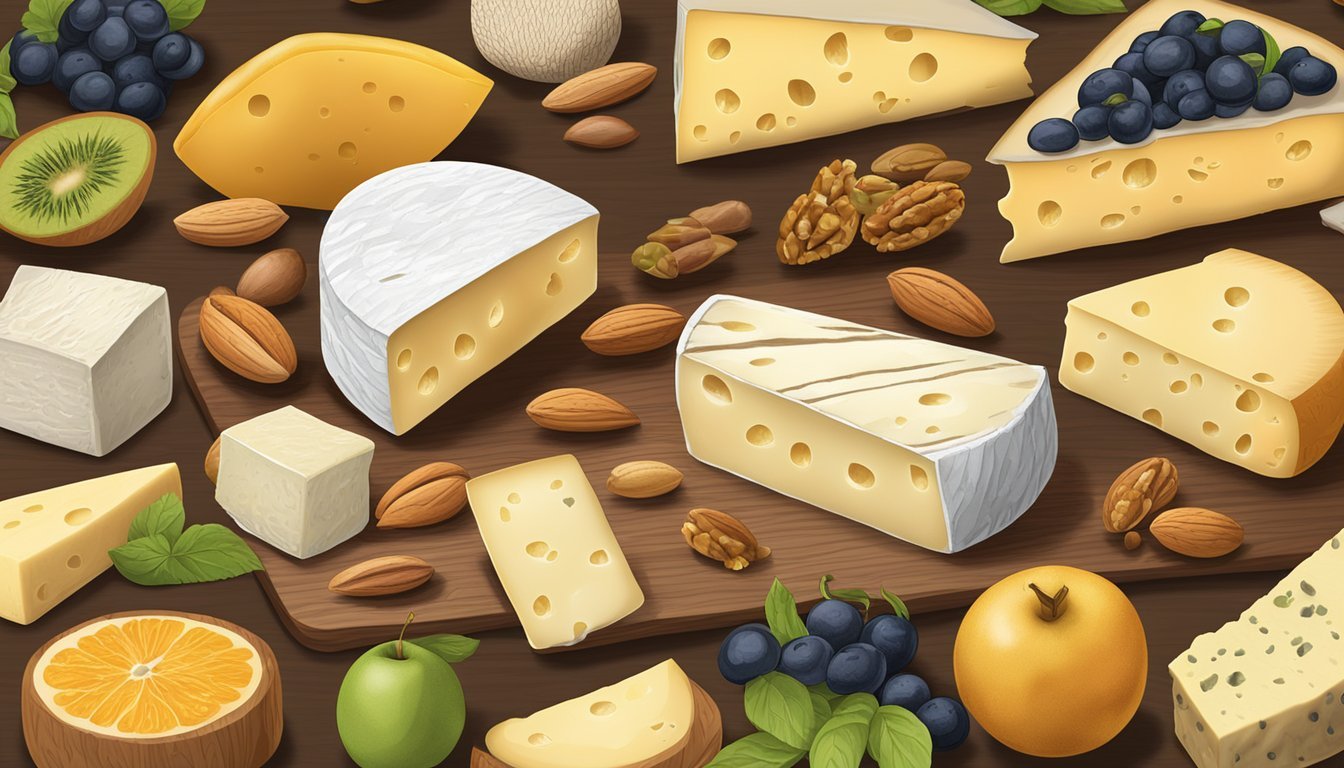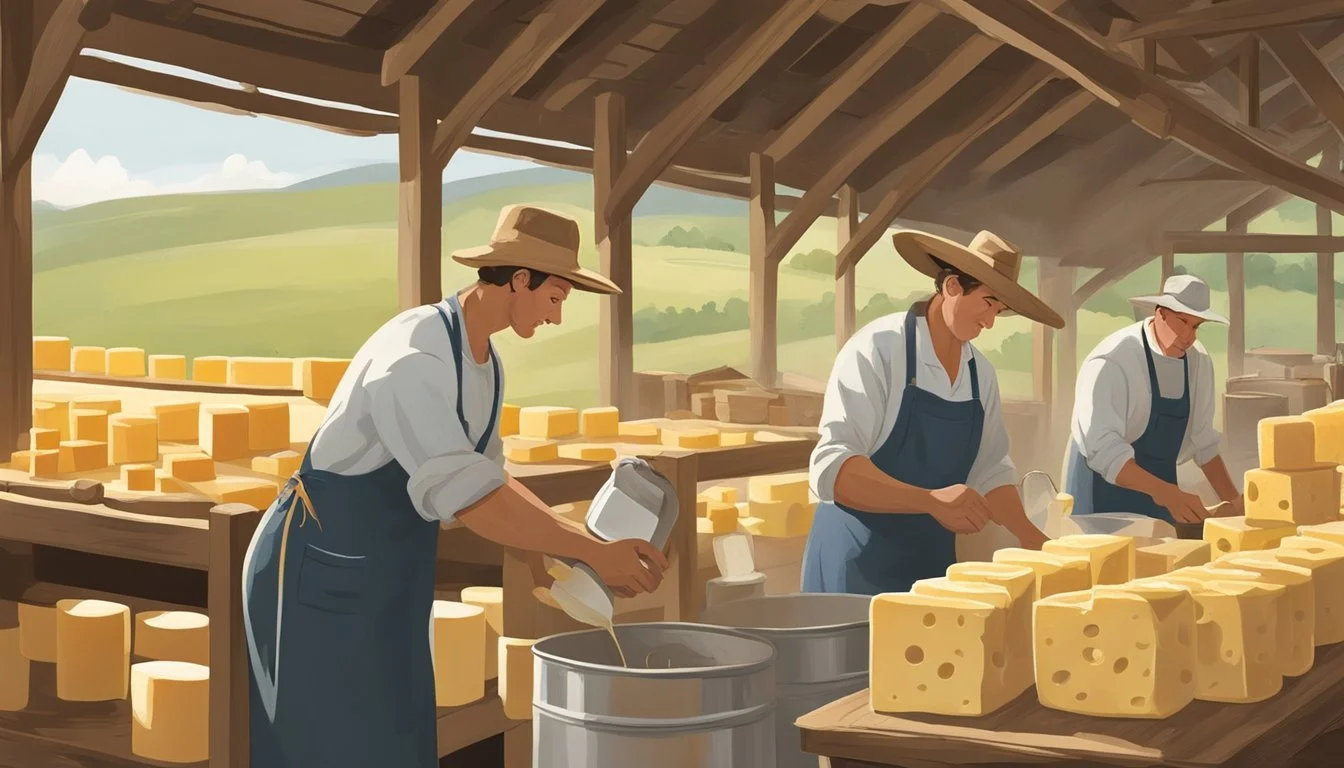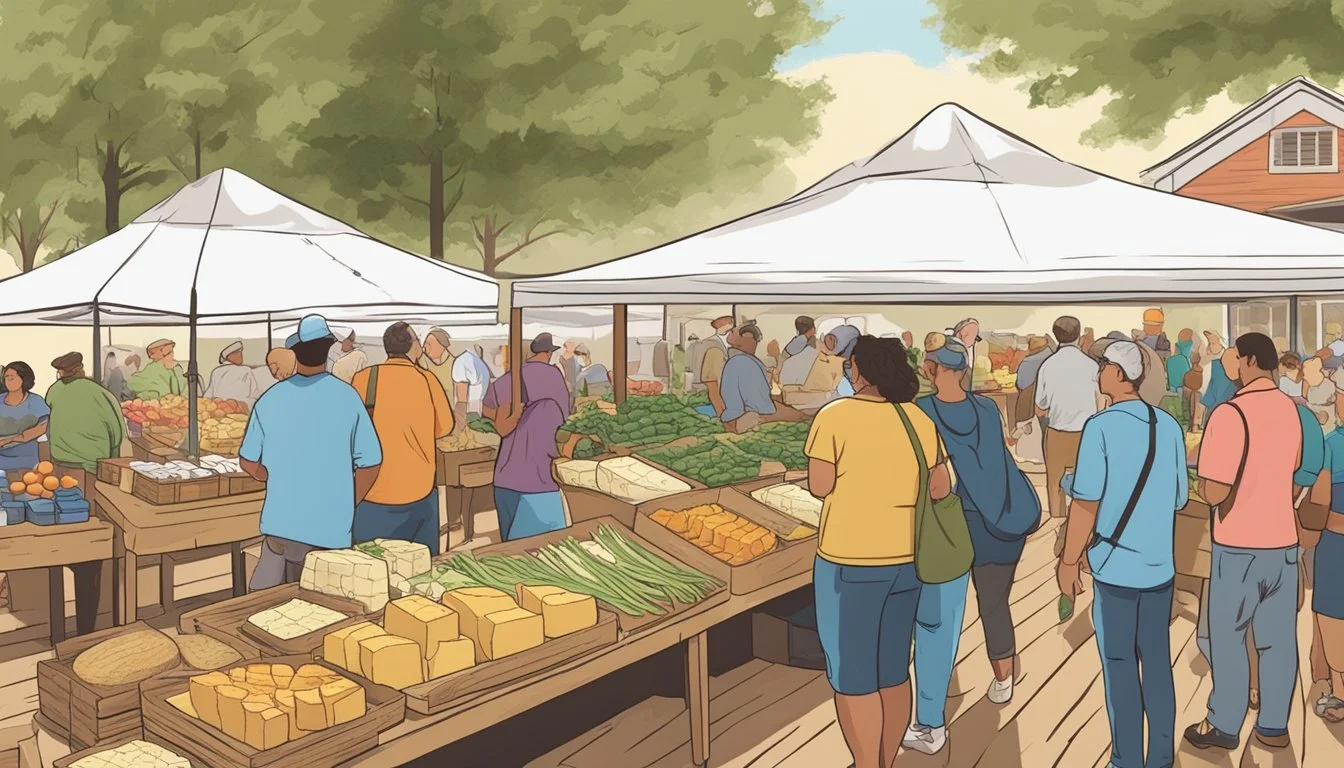North Carolina Artisan Cheese
A Guide to the State's Finest Handcrafted Delights
North Carolina harbors a unique tradition in the world of gastronomy, particularly renowned for its artisan cheese (how long does cheese last?). A blend of rich history, local expertise, and high-quality ingredients contributes to the state's reputation for producing outstanding cheeses (What wine goes well with cheese?). Making use of fresh, regional milk and embracing farmstead practices, cheesemakers across North Carolina are crafting a variety of distinctive cheese products. From the sharp tang of aged cheddar to the creamy decadence of artisanal blue cheeses, (What wine goes well with blue cheeses?) there's a depth of flavor and innovation rooted in each product.
The landscape of cheese producers in North Carolina is as diverse as the cheeses themselves. Small, family-run operations like Looking Glass Creamery reveal the careful touch of making farmstead cheese, where the entire process from milking cows to aging cheese occurs on their own property. Meanwhile, cheese enthusiasts can explore and sample eclectic offerings along the Western North Carolina Cheese Trail—a collective that promotes the region's artisanal cheesemakers. Although not all members are open to the public, those who do visit these farms will find a passion for cheesemaking that is as palpable as the taste of the finished product.
History of North Carolina Artisan Cheese
North Carolina's cheese history is marked by a transition from traditional methods to the rise of small-scale, artisanal production, nurturing a rich cheese-making culture within the state.
Early Beginnings
The inception of artisan cheese making in North Carolina can be traced back to family-operated farms. These early endeavors laid the foundation for a state that prides itself on its dairy heritage, pivoting from bulk commodity cheese production to more refined, handcrafted products. Yellow Branch Pottery & Cheese stands out as a notable entity within this historical timeline. Established in 1986 as the state's oldest farmstead cheese producer, it has set a benchmark for artisanal cheese in North Carolina. Initially focusing on recipe development in 1981, Yellow Branch's roots underline the gradual shift towards artisan methods.
Rise of Farmstead Movement
As the appreciation for craft and quality grew, so did the farmstead movement within North Carolina. Farmstead producers, who create cheese exclusively from the milk of the farm's own herd, began to gain prominence. Establishing a reputation for fine, handcrafted cheeses, these artisan producers maintain a tight-knit closeness to the source of their milk, ensuring superior flavor and freshness. Farms like Buffalo Creek Farm & Creamery have embraced this philosophy, producing distinctive farmstead cheeses from goat milk since opening their farm store in 2011.
This movement is bolstered by entities such as the WNC (Western North Carolina) Cheese Trail, a nonprofit organization dedicated to promoting the region's artisan cheeses. The trail comprises a diverse assortment of cheese-centric businesses, including not only cheesemakers but also wineries, cideries, restaurants, and shops. Collectively, they offer an immersive cheese experience that strongly supports North Carolina cheesemakers. The presence of the trail highlights the growth and significance of the artisan cheese circuit in North Carolina and echoes the state's shift towards locally-produced, handcrafted food products.
Understanding Artisan and Farmstead Cheese
In North Carolina, a rich tradition in dairy product craftsmanship is evident through its artisan and farmstead cheeses. These products are celebrated for their quality and the meticulous process behind their creation.
Artisan Cheese Defined
Artisan cheese is characterized by cheeses that are produced in small batches, prioritizing quality and traditional methods. Cheesemakers invest significant care and attention to detail through each step of the process. Artisan cheese often reflects the unique flavors of the region’s terroir.
Farmstead Cheese Distinction
Farmstead cheese takes the concept of artisan cheese further by stipulating that the milk used in the cheesemaking must come from the farm where the cheese is produced. The connection between the livestock and the final product is essential, ensuring that the entire process, from milking to maturation, occurs on-site. Farmstead cheeses, by their very nature, are also artisanal due to the handcrafted approach to their production.
The Cheese Making Process in North Carolina
In North Carolina, cheese making is a craft that blends tradition with innovation, producing flavors that reflect the rich terroir of the region. From sourcing to aging, every step is carefully managed to ensure a high-quality end product.
Sourcing the Milk
Artisan cheesemakers in North Carolina begin by sourcing high-quality milk, primarily from local cows and goats. They establish close relationships with nearby farms to obtain the freshest milk, rich in flavor and nutrition. The proximity to local dairies not only supports the area's agriculture but also provides the cheesemakers with the ability to influence the diet of the animals, which can alter the taste and quality of the resulting cheese.
Cheese Craftsmanship
Crafting cheese in North Carolina is both an art and a science, with cheesemakers often inheriting techniques passed down through generations or studying modern methods. They carefully:
Curate cultures to develop specific cheese characteristics
Manipulate moisture levels—higher for soft cheeses, lower for harder varieties
Add ingredients like herbs or pepper for added flavor
The diversity of cheese types produced includes traditional cheddars, blue cheeses, and soft varieties like chèvre.
Aging and Flavor Development
Aged cheese is a specialty of North Carolina's artisans. Caves and aging rooms with controlled environments are common, where temperatures and humidity levels are meticulously managed. This controlled aging process allows for the development of sophisticated flavors and textures in cheeses like:
Blue cheese: Cave-aged and developed with distinct veining
Cheddar: Aged to achieve the classic sharpness
Each cheesemaker has their approach to aging, some using local wine or beer to wash rinds or allowing natural molds to influence the taste profile. The aging duration varies from a few weeks to several years, greatly enhancing the flavor.
North Carolina's Dairy Farms and Creameries
North Carolina boasts a rich tradition of dairy farming and cheesemaking, with farms and creameries across the state producing a wide array of artisan cheeses.
Farmstead Operations
Farms serve as the backbone of North Carolina's dairy industry, many operating with a focus on sustainable practices and animal welfare. Oak Moon Farm and Creamery in Bakersville stands out for its philosophy that high-quality goat milk, crucial for excellent cheese, starts with the well-being of their animals. Round Mountain Creamery, located in Black Mountain, prides itself on producing cheese from the milk of Alpine and LaMancha goats, nurtured on their farm to create cheese with distinct flavors.
Fading D Farm exemplifies a dedicated approach to farmstead cheesemaking by raising water buffalo and creating Italian-style cheeses, a unique specialty in the region. Producers like English Farmstead Cheese in Marion continue longstanding traditions with over 90 years under their belt, emphasizing their historical roots in the dairy community of Western North Carolina.
Notable Creameries and Their Specialties
Looking Glass Creamery, operating since 2009, is renowned for sourcing milk from North Carolina dairy farms to craft their celebrated cheeses. Their products are pivotal in showcasing the state's potential for fine cheesemaking.
In Fairview, Victor Chiarizia operates a creamery that not only produces exquisite cheeses but also contributes to the education of artisanal cheesemaking, spreading appreciation for the craft. Each of these creameries contributes its distinctive mark on the North Carolina cheese landscape, enriching the culinary tapestry with an impressive variety of high-quality, regional products.
Types of Cheeses from North Carolina
The North Carolina cheese scene offers a rich tapestry of flavors, showcasing traditional methods with a local twist. Artisan cheesemakers across the state contribute to a spectrum of cheese varieties, marrying time-honored techniques with the unique terroir of the region.
Popular Cheese Varieties
Blue Cheese: Steeped in tradition, North Carolina's blue cheese is characterized by its sharp, tangy flavor with a piquant aroma, creating a distinctive tasting experience.
Cheddar Cheese: A household name, Cheddar from North Carolina stands out with its firm texture and depth of flavor, ranging from mild to extra sharp.
Gouda Cheese: The state's Gouda variant, noted for its creamy, buttery texture, often carries subtle undertones of caramel and a slightly sweet finish.
Cheese Curds: Fresh cheese curds are a particular delight, known for their mild profile and the signature squeak when bitten into.
Unique Local Flavors
Artisan producers in North Carolina also craft cheeses that reflect the local flora and fauna, infusing regional herbs, spices, and adopting local milk sources. Cheese enthusiasts can find cave-aged options and handcrafted batches that emphasize the idiosyncrasies of the state's climate and forage, resulting in unique flavor profiles not found elsewhere.
Where to Find North Carolina Artisan Cheese
North Carolina offers a variety of locations where one can purchase high-quality artisan cheeses, from charming local shops to bustling farmers’ markets. Consumers have the convenience of both in-person shopping and online purchase options to explore the state's rich cheese offerings.
Shops and Local Stores
In Western North Carolina, one may visit Blue Ridge Mountain Creamery, known for its cave-aged and handcrafted cheeses. They offer an array of cheeses including Asiago, Blue, and Cheddar. For an interactive experience, cheese enthusiasts can follow the WNC Cheese Trail which connects a diverse array of members such as wineries, cheesemakers, and shops that celebrate the region's cheesemaking.
The Culture Shop in Charlotte is distinguished as a destination for those seeking rare and gourmet cheeses. Meanwhile, in West Jefferson, Ashe County Cheese welcomes visitors to their store at 106 E Main St, providing a local hub for cheese lovers.
Farmers' Markets and Fairs
Farmers' markets and local fairs serve as vital platforms for discovering North Carolina’s artisan cheeses. These events are perfect for meeting the cheesemakers and directly supporting local agriculture. A visitor might find a map of upcoming markets and fairs through a region's agricultural portal or on social media platforms such as Facebook, where many cheesemakers maintain an active presence for announcements and updates.
Online Purchase Options
For those who prefer the convenience of online shopping, several North Carolina cheesemakers have embraced e-commerce. Consumers can typically find a variety of cheeses available for purchase on a cheesemaker’s official website or on an affiliated cheese store's online platform. Online options often provide detailed descriptions of cheese products, along with recommendations for pairings and usage.
Experiencing Cheese in the Local Culture
In North Carolina, the thriving artisan cheese scene is intrinsically tied to local culture through pairings with regional wines, integration into traditional cuisine, and opportunities to engage with cheesemakers at various events.
Wine and Cheese Pairings
North Carolina's wine regions offer perfect companions for locally crafted cheeses. Western North Carolina (WNC) Cheese Trail members frequently collaborate with wineries to present well-curated wine and cheese pairings. Combining the region's cheeses with wines from local vineyards allows for a harmonious blend of flavors that reflect the local terroir. For instance, a sharp farmstead cheddar might be elegantly paired with a bold North Carolina Cabernet Franc.
Cheese in North Carolina Cuisine
Local restaurants across North Carolina are known to feature cheese curds and other artisanal cheeses in their dishes, embodying the farm-to-table concept. From appetizers to main courses, cheese made from cow, goat, and sheep milk grace menus with their presence. Dishes like pimento cheese spread, a Southern classic, are given a gourmet twist with the addition of high-quality, local dairy products.
Tours and Tasting Events
Cheese aficionados can immerse themselves in the cheese production process through tours and tasting events featured on the WNC Cheese Trail. By visiting creameries, like Round Mountain Creamery, guests get the opportunity to sample a variety of farmstead cheeses firsthand. Festivals, such as the Carolina Mountain Cheese Fest, spotlight these artisan producers, offering an educational yet gustatory experience dedicated to celebrating and understanding the craft of cheesemaking.
Supporting Local: The Impact
North Carolina's artisan cheese industry showcases a commitment to local food movements and farm-to-table practices that significantly benefit the regional economy and adhere to sustainable, ethical practices.
Economic Benefits
In North Carolina, artisan cheesemakers are more than a culinary trend; they represent a thriving sector with a substantial economic impact. As the largest cheese-producing region in the Southeast, the state has over 38 cheesemakers contributing around $10 million to the local economy. This growth is not only a boon for the cheese producers themselves but also stimulates related businesses such as local farms, wineries, cideries, and shops.
Revenue Generation: Local cheese sales directly boost the income of producers and contribute to the state's revenues.
Job Creation: Artisan cheese production and sales support employment opportunities in the region.
Sustainability and Ethical Practices
The local cheese industry in Western North Carolina (WNC) places high importance on environmental stewardship and ethical farming. Producers often rely on locally sourced milk, reducing the carbon footprint associated with long-distance transportation.
Farm-to-Table: Cheese trail members prioritize direct sourcing from local dairies, enhancing transparency and supporting the regional agricultural community.
Resource Management: Many producers engage in sustainable farming techniques to minimize waste and preserve local ecosystems.
Connecting with North Carolina Cheesemakers
North Carolina's rich tradition of cheesemaking is reflected through the passionate artisans who create unique cheeses. For those looking to explore and connect with these local producers, there are numerous opportunities that provide both education and firsthand experiences.
Cheesemaker Profiles
North Carolina boasts a variety of cheesemakers, each with their own story and special offerings. Artisans like those at Looking Glass Creamery and English Farmstead Cheese reflect a commitment to quality, often using milk from their own farms to produce favorites such as sharp cheddar, gouda, or more exotic options like lavender-infused chevre. Many cheesemakers manage a presence on Facebook and other social media platforms, sharing updates on new batches or events.
Looking Glass Creamery: Offers guided tastings and a glimpse into the cheesemaking process.
English Farmstead Cheese: Known for their handcrafted cheese curds and variety of aged cheeses (What wine goes well with aged cheeses?).
For those interested in meeting the cheesemakers and experiencing the cheese-making process, a useful tool is the North Carolina Cheese Trail map. It outlines almost 30 cheesemakers and outlets, pinpointing locations that welcome visitors. Some farms are open regularly, while others may only be available by appointment.
Educational Opportunities
Educational encounters on the North Carolina Cheese Trail allow for engaging farm-to-table experiences. Such opportunities are designed to enlighten visitors about artisan cheesemaking and the intricacies of the craft.
Cheesemakers provide various ways to learn:
Scheduled Visits: Arrange a tour to see how cheese is made and to understand the day-to-day operations of the farms.
Workshops: Participate in cheesemaking workshops for hands-on learning.
Tasting Sessions: Engage in sensory evaluations through guided cheese tastings.
The WNC Cheese Trail, a nonprofit organization, embodies this educational spirit by promoting the artisan cheese industry in Western North Carolina through its network of cheesemakers, farms, and affiliates.
When planning to visit or learn from these artisan producers, it is essential to check their availability and scheduled events directly, as not all members of the cheese trail are open to the public without prior arrangements.

